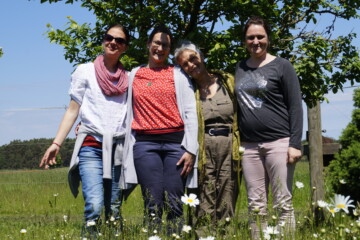Meditation
Learn to meditate: More calm and serenity + 5 tips for meditation beginners
Meditation helps you to go through life more mindfully, to find yourself and to improve your concentration. When you meditate, you focus your attention on the here and now. It can be helpful to listen to soothing music, smell a pleasant fragrance or have an imaginary vision in front of your eyes. The focus on one thing calms the mind, and ideally your thoughts will come to rest as well.
If you meditate regularly, you can benefit from many positive effects in the long term. Instead of getting lost in your fears and worries, you give your thoughts a rest and you become the observer of the present moment.
With our offers for meditation retreats, coaching and online workshops you will learn how to build up a regular meditation practice even as a meditation beginner or how to deepen an already existing practice in order to find more peace and serenity in everyday life.
Why you should learn to meditate
Meditation for stress relief
Regular meditation positively supports stress reduction. When your thoughts calm down, the stress hormones in your blood decrease and therefore regulate your stress levels. The impressive thing is that meditating does not only work in the short term, but also changes your brain structures in the long term. The more often you meditate and reach a state of meditative relaxation, the more relaxed you will feel. You will notice that over time you will be able to look at difficult situations more objectively and no longer get lost in the annoying trivialities of your job and everyday life.
Meditation and sleep
A good and restful sleep is important for our well-being. By meditating regularly, you learn to focus on the present moment.
Then, instead of tossing and turning in the evening worrying about the next day, you focus your attention on the here and now, which helps you fall asleep more peacefully.
Other benefits of regular meditation include:
- reduced stress
- helps with anxiety and worry
- improved mindfulness
- improved sleep
- more serenity & calmness in everyday life
- improved concentration & more focus
- improved immune system
- more energy
- more positive feelings
- improved self-esteem and self-confidence
Meditation instructions for beginners: Learn to meditate in 5 easy steps
How do you learn to meditate? You don’t need much to learn meditation. We show you how you can learn to meditate in just 5 simple steps, even as a meditation beginner. The only thing you need is yourself, your breath and a quiet place.
Find the perfect place for your meditation
To learn to meditate, it is important that you create your own personal place of stillness. Find a quiet place where you feel comfortable and undisturbed. It can also be a place in nature or in your garden. To help you find inner peace, outer silence is helpful. Switch off your mobile phone and all other disturbing factors. You can also decorate your meditation place with fragrances, quiet meditation music and personal objects. The important thing is that you feel comfortable and can come to rest. Make this place your permanent meditation place, your place of stillness, where you retreat to in times of restlessness. Our meditation workshops, seminars and retreats are not only a great place to get your start in meditation, but also to find inspiration for your own meditation space at home.
Find the right position
The most common position for meditation is cross-legged or lotus. To be more upright you can sit on a blanket or cushion. When meditating, one thing is very important: you must feel comfortable! Therefore, you should not be distracted by an uncomfortable sitting position and your spine must be as straight and relaxed as possible. This will ensure that the energy flow in your body is not obstructed. If sitting for long periods of time is too uncomfortable, you can always meditate lying down. In the supine position you have more comfort and your spine is automatically stretched. Basically, meditation should never be dependent on your physical position, but can be practised anywhere and in any position.
Proper duration and time of your meditation
The duration of your actual meditation is less relevant, especially in the beginning. It is much more important that you meditate regularly. Ten minutes in the morning is sufficient at the beginning. Try to integrate short meditation sessions into your daily routine to train your brain for the meditative state, rather than practising meditation once a week for a longer period of time.
Whether you prefer to meditate in the morning or evening is up to you and your personal routine. If you meditate in the morning right after getting up, your mind will still be fresh and clear and it will be easier for you to focus your attention completely on yourself. Thanks to the wide range of meditations offered by our providers, you can try out different meditations and routines to find the one that suits you best. After a while you will notice what feels right for you and develop a lasting routine. Try to meditate at the same time each day and gradually increase the duration of your meditations.
Begin your meditation
What is the best way to learn to meditate? After you have found a place of silence and a position that is comfortable for you, you can begin with the actual meditation.
First close your eyes. Breathe in deeply for a while and slowly breathe out again. Focus your attention on the breaths. Breathing helps you to find yourself.
Our tip: Don’t force yourself to think about nothing, but let your thoughts pass you by like clouds. Accept all thoughts that arise and then let them go again. If you do get too distracted by your thoughts, bring your attention back. This will happen to you more often, especially in the beginning. Accept it, notice it and bring your focus back to the moment. To become more mindful in your everyday life, you can incorporate more mindfulness exercises into your daily routine.
Learn meditation with calmbase
From mindfulness meditations and visualisations to body scan or yoga, there are many types of meditations. For beginners and newcomers, we recommend attending one of our meditation workshops, a meditation seminar or even a retreat. Our providers, coaches and experts at calmbase will individually address your needs and goals and help you get started with meditation and deepen your meditation practice. They advise you on questions that arise and develop a meditation routine together with you. And now we hope you enjoy browsing through our meditation offers.
Meditation: Angebote
- Sortieren nach:
11-tägiges Luxus-Yoga-Retreat in Mosambik
Vilanculos, Vilankulo, Inhambane, 1304, Mosambik- 8 Teilnehmer
- Body, Mind
- Termine auf Anfrage
Kloster-Sommer-Retreat: Stille und Achtsamkeit
Sankt Ottilien, Erzabtei, Sankt Ottilien, Eresing, Windach, Landkreis Landsberg am Lech, Bayern, 86941, Deutschland- 12 Teilnehmer
- Body, Mind, Soul
- Termine auf Anfrage
Kloster-Winter-Retreat : Stille, Besinnung & Erneuerung
Sankt Ottilien, Erzabtei, Sankt Ottilien, Eresing, Windach, Landkreis Landsberg am Lech, Bayern, 86941, Deutschland- 12 Teilnehmer
- Body, Mind, Soul
- 10.12.2024 - 13.12.2024
Yoga Retreat in der Rhön – RECONNECT YOURSELF
Bio Hotel Sturm- 15 Teilnehmer
- Mind
- 05.12.2025 - 07.12.2025
Achtsam ins neue Jahr starten
57, Engerstraße, Hunnebrock, Bünde, Kreis Herford, Nordrhein-Westfalen, 32257, Deutschland
- 10 Teilnehmer
- Body, Mind, Soul
- Termine auf Anfrage
3 Tage Yoga Retreat mit Meditation im Bergischen Land
Online-Angebot- 12 Teilnehmer
- Body, Mind, Soul
- Termine auf Anfrage
Ausbildung Yoga RetreatleiterIn mit Zertifikat
Online-Angebot- 20 Teilnehmer
- Body, Mind, Soul
- Termine auf Anfrage
Meditationswochenende im Heuhotel
13, Wannefeld, Gardelegen, Altmarkkreis Salzwedel, Sachsen-Anhalt, 39638, Deutschland
- 15 Teilnehmer
- Body, Mind, Soul
- verschiedene, 27.07 - 15.09.2024









